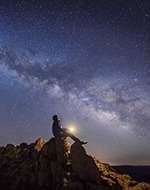This publication from the Board on Science Education summarizes a workshop held in April 2016 that explored the current and potential role of service-learning in undergraduate geosciences education. The term “service-learning” generally refers to projects planned as components of academic coursework in which students use knowledge and skills taught in the course to address real needs in their communities. This kind of learning experience, which allows students to focus on critical, reflective thinking and civic responsibility, has become an increasingly popular component of undergraduate science education.
Service-learning projects may involve many sorts of activities that link students directly with people and groups in their communities so they can collaborate to solve problems. What is generally characteristic of service-learning projects is that they allow students to connect their coursework with real-world problems, to see how information they learn in class can be applied in solving problems and improving their communities, and to reflect on what they learn from the experience. For example, students might conduct a greenhouse gas emissions inventory for their college campus; investigate contaminant transport in a local watershed and identify potential risks to the local population; or examine the impact of geologic hazards on the human population and design appropriate responses.
Service-learning fits well with the goals for undergraduate study in the geosciences—the disciplines concerned with the Earth, which include geology; geophysics; geochemistry; and atmospheric, polar, and ocean studies. Researchers in these disciplines explore natural processes and help people understand their relationship to the environment in which they live—they help people locate and use needed resources, prepare for natural disasters, and understand changes in climate, for example. Students in geoscience fields study issues such as landscape evolution, environmental challenges,
energy use and production, weather and climate, and their effects on society. These kinds of topics naturally highlight the direct links between academic studies and real-world issues.
Students doing service-learning projects as part of their geoscience education work with their faculty advisors to identify projects that address real-world issues, are of genuine importance in their communities, and draw on the knowledge and skills learned in geoscience courses. The students are given some autonomy to devise solutions to problems and are called on to reflect on how they have approached the task, the successes and challenges they encountered, and what they learned from the experience.






